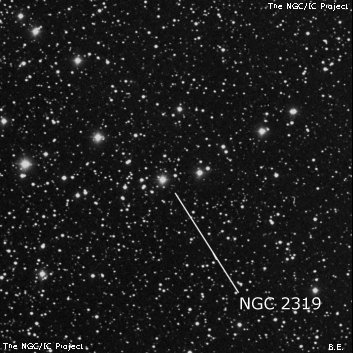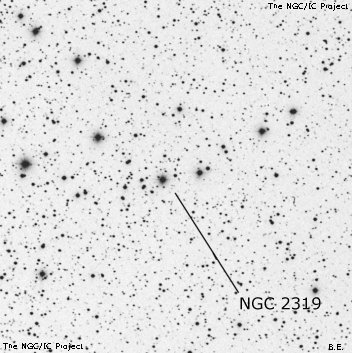NGC/IC Project Restoration Effort
(This is a very very beta version)
NGC2319


Basic Information
Location and Magnitude
Right Ascension: 7:0:32.2
Declination: +3:2:34
Constellation: MON
Visual Magnitude:
Historic Information
Discoverer: Herschel W.
Year of discovery: 1783
Discovery aperture: 18.7
Observational
Summary description: Cl of v sc st, st 8, 9…
Sub-type: *Grp
Corwin's Notes
=====
NGC 2319. This object has a curious history. Before I get into that,
however, I should say that I've finally assigned the number to h 423 which JH
describes as a "Linear cluster of stars, forming a bent line nearly 15 arcmin
long, terminated on the following side by a star 8 ..." He calls the cluster
"VIII 1," though it is not (more below).
The position I've assigned (06 57 55, +03 06.8; 1950) is for the mid-point of
the chain, rather than that of JH's 8th magnitude star (he gives 06 58 31,
+03 07.9 -- also 1950 -- less than an arcmin from the true position), so the
RA is well off JH's, though the object is clearly the one that he saw. For
the GC, he used his own position for the object rather than his father's (for
reasons apparent below), and Dreyer did the same for NGC. This leads us
unambiguously to JH's "bent line" as NGC 2319.
Curiously and perhaps unfortunately, both JH in GC and Dreyer in NGC also
assigned an unusual WH number to the object: VIII 1B. There is no VIII 1A,
and VIII 1B turns out to have nothing to do with VIII 1 (which is NGC 2509)
except that it follows the first entry chronologically in WH's list of
scattered clusters.
So, to the history. Dreyer has a short note in the NGC, beginning with JH's
note in the GC: "Entered by CH as VIII 1B, with a remark `not in print.' --
JH." Dreyer continues, "It must be a very poor cluster; at any rate, Auwers
could not find anything like a cluster in this place."
Dreyer inserts VIII 1B in his 1912 edition of WH's first catalogue with an
extensive note giving some of the details of WH's Sweep 48 on 18 December
1783. In short, WH's observation puts the cluster around 1950.0 RA = 06 45.3,
and between +02 06 and +03 21. He describes it as "A cluster of very small
stars, not rich." This is obviously too far off JH's position to be the same
object, so I am wondering how JH arrived at the identity.
In any case, there is no obvious cluster matching both WH's position and his
description. Two objects partially match, however: Collinder 115 (at 06 44
03, +01 49.4 for 1950) matches the description, but is well off in position.
A scattered group of 9th to 12th magnitude stars at 06 44 52, +03 08.0 comes
closer to the position, but the stars -- particularly the 9th magnitude star
near the center -- are too bright to appear "very small" to WH. I see
nothing else that could be WH's cluster.
In the end, H VIII 1B remains a footnote, unidentified and probably
unidentifiable (though a careful scrutiny of the Herschel Archive might turn
up more information than Dreyer found -- but that's unlikely in my opinion).
Its connection with NGC 2319 is a mistake by JH and Dreyer, and it has no
other NGC number.
Steve's Notes
=====
NGC 2319
17.5" (2/1/03): very nice 15' string of a couple dozen stars heading west of a mag 8.9 SAO 114784 on the east end, which is a close unequal double. The tail of stars is slightly concave to the south and is marked by a mag 10.5 star at the west end. Although the star chain is quite noticeable, it could well be an asterism as there are other similar strings of stars in the same or adjacent fields. Listed as nonexistent in the RNGC.



